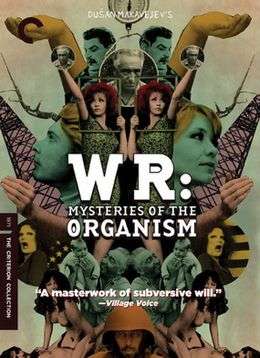W.R.: Mysteries of the Organism
| W.R.: Mysteries of the Organism | |
|---|---|
 DVD cover of the movie | |
| Directed by | Dušan Makavejev |
| Produced by | Dušan Makavejev |
| Written by | Dušan Makavejev |
| Music by | Bojana Marijan |
| Cinematography |
Aleksandar Petković Pega Popović |
| Edited by | Ivanka Vukasović |
Release dates |
|
Running time | 85 min. |
| Country |
Yugoslavia West Germany |
| Language |
Serbo-Croatian English |
W.R.: Mysteries of the Organism (Serbian: W.R. - Misterije organizma, W.R. - Мистерије организма) is a 1971 film by Serbian director Dušan Makavejev (born 1932) that explores the relationship between communist politics and sexuality, as well as presenting the controversial life and work of Austrian-American psychoanalyst Wilhelm Reich (1897–1957). The film's narrative structure is unconventional, intermixing fictional and documentary elements.
After initial screenings, both in and out of Yugoslavia, W.R. was banned in that country for the next 16 years. Makavejev was subsequently indicted there on criminal charges of "derision" towards "the state, its agencies, and representatives" after he made intemperate remarks to a West German newspaper about the ban.[1] His exile from his home country then became permanent until the end of the regime.
Synopsis
The film intercuts documentary footage and clips from other films — notably the Stalinist propaganda film The Vow (1946) — with an imaginative and satirical narrative about a highly political Yugoslav woman who seduces a visiting Soviet celebrity ice skater. Despite different settings, characters and time periods, the different elements produce a single story of human sexuality and revolution through a montage effect.
The woman, Milena, violates her proletariat convictions (and rejects the sexual advances of a worker) by pursuing a Joseph Stalin-like celebrity ice skater — Vladimir Ilyich (Lenin's first and middle names) — who represents both class oppression and corruption from the West into communist beliefs. She succeeds, with difficulty, in sexual consummation, but V.I. is unable to reconcile his inner conflicts and ends the encounter by decapitating her. Distraught, V.I. sings a Russian song after the murder: "François Villon's Prayer" by Bulat Okudzhava.
Sequences
Tuli Kupferberg
Poet and performance artist Tuli Kupferberg (1923–2010) of band The Fugs, dressed as a soldier, parodies war and the sexual nature of man's fascination with guns by stalking affluent New Yorkers on the street and masturbating his toy rifle. As part of the climax of the film, the gun masturbation is intercut with other orgasmic sequences. This segment highlights Reich's ideas that sexual frustration and violence are connected.
Artists
Artist Betty Dodson (born 1929) discusses her experiences in drawing acts of masturbation, as well as her discussions within consciousness raising groups about female sexual response. The Dodson sequences are relatively straight forward documentary interviews; Dodson's large scale drawing of a man masturbating dominates the background of the shots. This segment illustrates a more free attitude toward sexuality.
Nancy Godfrey is an artist who makes a cast of Jim Buckley's erect penis as a documentary part of the film. This scene was a point of contention for the censors. On UK video prints Buckley's penis is covered with psychedelic colors added in editing (the cinema version was unusually passed fully uncut). Godfrey proved her sexual contact with a famous man by casting his erect penis, and is among a loose group of practitioners called Plaster Casters.
Jackie Curtis
Jackie Curtis (1947–1985), one of Andy Warhol's entourage and occasional film star, is shown on the streets of New York enjoying an ice cream cone with a partner. Curtis' appearance highlighted Reich's theories of gender and sexuality.
Screw
Screw is an "underground" magazine that often focused on sexual issues. The film only shows one scene of Screw magazine, where editors work in the nude.
Alexander Lowen
The film also features a rare on-screen interview with neo-Reichian therapist Alexander Lowen (1910–2008), the founder of bioenergetic analysis, during a therapy session, including scream treatment.
Others
Reich's daughter Eva (1924–2008) appears on camera, speaking about the high accuracy of her father's work and the sickness of contemporary life.
The Orgonon, Reich's last home and lab near Rangeley, Maine, USA, is seen with brief shots of the interior and exterior, including a cloudbuster.
A couple of scenes in the film are re-stagings of scenes from Sergei Eisenstein films, to allude to a moment of more pure (truthful) film making in the Soviet Union.
Shots of the incinerator in which Reich's books were burned in New York City are included.
Cast
|
|
Interpretation
In classes given at New York University Department of Cinema Studies in 1975, Makavejev alluded to his frustration that idealistic communism had become corrupted in practice in Eastern Europe and the Soviet Union because it had abandoned free love and open sexuality as a way of freeing economic and political oppression. These ideas are central to this film as the Soviet ice skater can not cope with his huge and healthy sexual hunger and converts that energy into a murderous rage.
Among the central themes of the film is the degradation of pure communism, the Western-like repression of free sexuality, and the ignored applicability of Reich's theories of human sexuality to personal freedom also in economic and political realms.
Reception
W.R. won acclaim from critics at the Cannes Film Festival in 1971, but due to the state ban was shown only in a few selected audiences in Yugoslavia for the next several years.
References
- ↑ Anderson, Raymond N. (4 February 1973), "Yugoslav Acts to Indict a Key Film Maker for Derision", The New York Times.
See also
External links
- W.R.: Mysteries of the Organism at the Internet Movie Database
- W.R.: Mysteries of the Organism at AllMovie
- The Criterion Collection
- James DeMeo "Critical Review: Dusan Makavejev's WR Mysteries of the Organism"
- "WR: Mysteries of the Organism: Anarchist Realism and Critical Quandaries," Richard Porton, LOLA